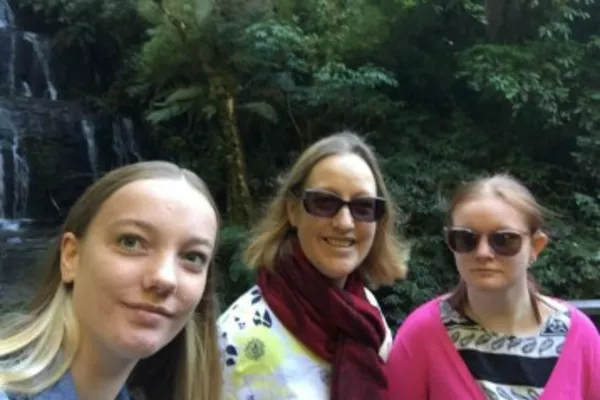Susannah's story
15 Jun 2021
I was diagnosed with Trigeminal Neuralgia (TN) 11 years ago, at the age of 32. At that time my daughter with special needs was 10 and my younger daughter was almost six. I am a solo mum. My GP diagnosed it immediately but she referred me to the maxillofacial surgeon at the hospital for an expert diagnosis.
This was a humiliating experience that resulted in a complaint through the Health and Disability Commissioner. Having been in excruciating pain, I had been unable to keep up my oral health which is very normal when living with TN. The surgeon examined me, asked me if I actually owned a toothbrush, then told me I don’t have TN, just poor dental hygiene. Thankfully, my GP continued to treat it as TN despite this. I had long periods in remission until 2018 when the pain came back with a vengeance and without any more remissions. My GP got the pain largely under control until the end of the year when it became totally unbearable. My GP consulted with a neurologist from our DHB, but whose services are based two and a half hours away, who suggested a new medication, and then saw me in the New Year.
The pain that I experience with TN is excruciating, and because cold weather, wind, vibrations (loud music) and so many other things - even eating - can trigger it, I could only go out the front door with my face swaddled in a scarf and I spent the least amount of time possible outside. This was how I lived until my operation. After an MRI and a further consultation the neurologist referred me to a neurosurgeon. This also didn’t go well; I had done some research so I knew that if I required surgery there were two main options. I went into the appointment hoping to not require surgery but if I did then I wanted the less invasive of the two. My entire appointment was 10 minutes from meeting the surgeon to leaving his office. In that time he was able to confirm that I did need surgery; he refused to consider the option of surgery that I preferred; and his answer to every question around the surgery was “Don’t worry about it, you’ll be fine”- for someone with type 1 diabetes and several complications including chronic kidney disease this was not at all reassuring. He also tried to get me to sign the consent forms for the bigger surgery. I understand now why the bigger surgery was required but this surgeon took no time to explain why, he just told me that he had not performed the smaller one for 14 years and wouldn’t do it. I said I wasn’t prepared to sign the consent form so he said he would see me in six months - which would be April 2019.
None
The recovery from the second surgery has been a much harder journey, with complications of severe nausea, vertigo and balance issues persisting (I’ve just started using a walking stick occasionally to help with the balance issues). At the time of my surgery I was on a tremendous amount of medications including Gabapentin, Baclofen, Conazapam, Nortriptyline and Tramadol. These medications not only impacted my daily living - I slept for long periods of time and was too tired and unsteady to cook or clean - but it negatively affected my declining kidney function too.
I have never met anyone else with TN. There are about four or five people in my local area that we know of through our Facebook support group, and approximately 300 in NZ who are connected by social media. Being a part of this online support group has given me new friends, a place to ask questions all the time, find out about other people’s experiences of different things TN-related and to be able to support others. No one, not even our closest support team sometimes, knows how difficult life is when you live with chronic pain and need to take such strong medications for it. It’s good to be able to vent to those who understand, but also to share our successes or highlights to the group. This story of debilitating pain and being unable to function due to the pain and the medications we take is very typical of sufferers I have connected with on our FB support page.
My daughters ended up doing everything for me - cooking, cleaning - and they missed out on so much time with me because of these factors. These would all help those who have TN:


